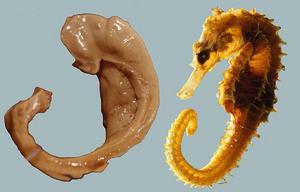>Mt.kiki (Created page with " link=http://yumenikki.wikia.com/wiki/Barracks_Settlement|frame|left|The Barracks Settlement ==[[List...") |
>Mt.kiki (Adding categories) |
||
| Line 93: | Line 93: | ||
#To [http://en.wiktionary.org/wiki/leave <u>leave</u>] one's duty or post, especially to leave a [http://en.wiktionary.org/wiki/military <u>military</u>] or [http://en.wiktionary.org/wiki/naval <u>naval</u>] [http://en.wiktionary.org/wiki/unit <u>unit</u>] without permission. | #To [http://en.wiktionary.org/wiki/leave <u>leave</u>] one's duty or post, especially to leave a [http://en.wiktionary.org/wiki/military <u>military</u>] or [http://en.wiktionary.org/wiki/naval <u>naval</u>] [http://en.wiktionary.org/wiki/unit <u>unit</u>] without permission. | ||
#:''Anyone found '''deserting''' will be shot.'' | #:''Anyone found '''deserting''' will be shot.'' | ||
[[Category:Name]] | |||
Revision as of 13:58, 11 November 2013
Strange orange creature(Hippocampus)
The earliest description of the ridge running along the floor of the temporal horn of the lateral ventricle comes from the Venetian anatomist Julius Caesar Aranzi (1587), who likened it first to a silkworm and then to a seahorse (Latin: hippocampus from Greek: ἵππος, "horse" and κάμπος, "coiled").
※Seahorse⇒Seahorse (The Barracks Settlement)
The German anatomist Duvernoy (1729), the first to illustrate the structure, also wavered between "seahorse" and "silkworm." "Ram's horn" was proposed by the Danish anatomist Jacob Winsløw in 1732; and a decade later his fellow Parisian, the surgeon de Garengeot, used "cornu Ammonis" - horn of (the ancient Egyptian god) Amun.[3]
※Egyptian god⇒The Widerness(Desert)
Another mythological reference appeared with the term pes hippocampi, which may date back to Diemerbroeck in 1672, introducing a comparison with the shape of the folded back forelimbs and webbed feet of the Classical hippocampus (Greek: ἱππόκαμπος), a sea monster with a horse's forequarters and a fish's tail. The hippocampus was then described as pes hippocampi major, with an adjacent bulge in the occipital horn, the calcar avis, being named pes hippocampi minor.[3]
※Seahorse (The Barracks Settlement) ⇒hippocampi minor
The Widerness(Desert)
desert (plural deserts)
- A barren area of land or desolate terrain, especially one with little water or vegetation; a wasteland.
- (figuratively) Any barren place or situation.
The Barracks Settlement(Desert)
desert (third-person singular simple present deserts, present participle deserting, simple past and past participle deserted)
- To leave (anything that depends on one's presence to survive, exist, or succeed), especially when contrary to a promise or obligation; to abandon; to forsake.
- You can't just drive off and desert me here, in the middle of nowhere.
- To leave one's duty or post, especially to leave a military or naval unit without permission.
- Anyone found deserting will be shot.



